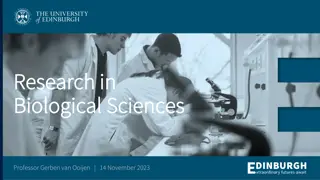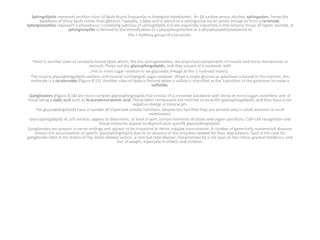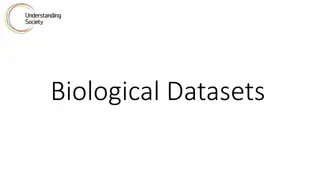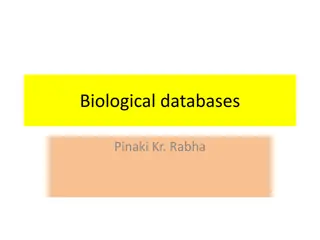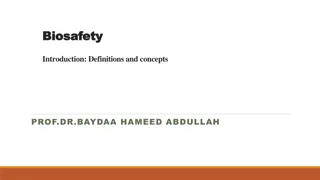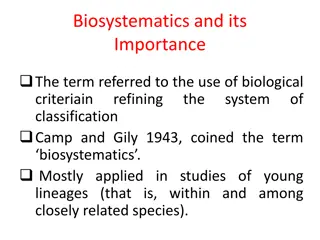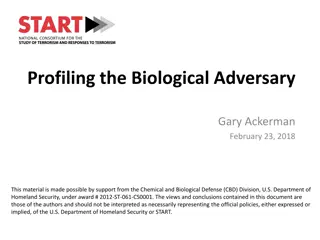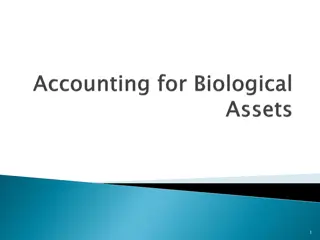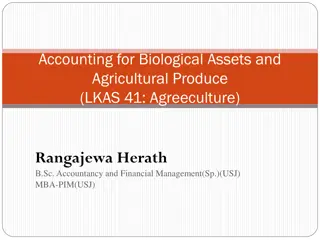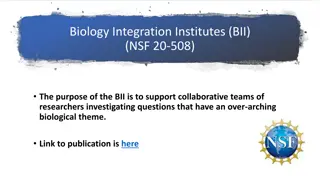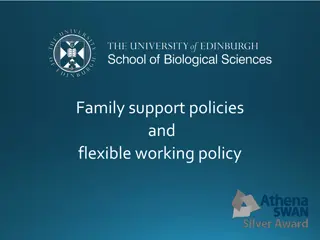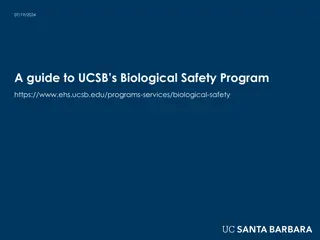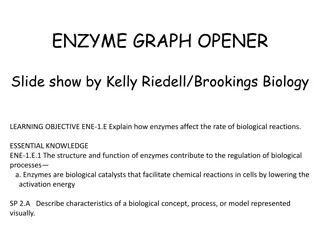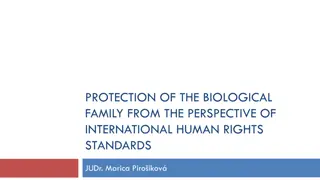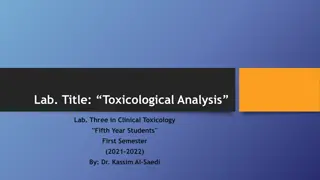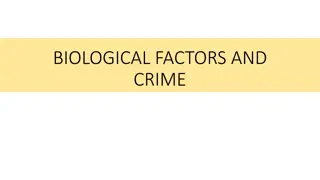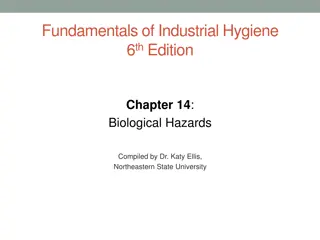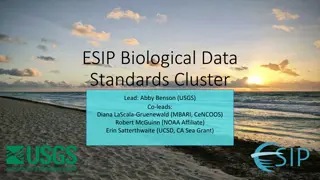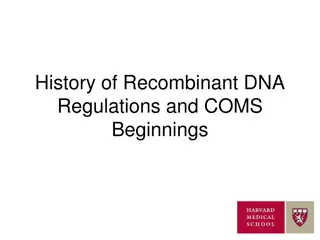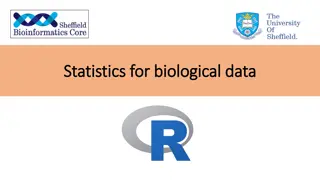Family Nursing & Home visit
Family health nursing focuses on maximizing the well-being of individuals within a family system. It involves promoting self-care abilities, protecting health, and integrating comprehensive planning tailored to family units. Emphasis is placed on the interconnectedness of family health and individua
0 views • 44 slides
RADIATION BIOLOGY
Radiobiology is the study of how ionizing radiation impacts living organisms. It involves direct and indirect effects on biological molecules, leading to the formation of free radicals that can cause cellular damage. The process includes the radiolysis of water, generation of hydrogen peroxide, and
0 views • 64 slides
Opportunities in Postgraduate Research in Biological Sciences
Explore the benefits of postgraduate research in Biological Sciences, such as advancing global challenges, acquiring critical thinking skills, building a professional network, and personal development in a supportive environment. Discover the international research excellence, quality of life, and k
0 views • 17 slides
Biological Registration Process and Administrative Controls for Safety Focus
Registering work involving biological materials, toxins, and recombinant DNA is essential for safety compliance. Principal Investigators must follow NIH guidelines and register with the Institutional Biosafety Committee. Contact NIH for additional instructions on working with toxins and Select Agent
4 views • 13 slides
Explore Agricultural and Biological Engineering (ABE) Programs at Purdue University
Discover the academic programs and valuable resources offered by the Agricultural and Biological Engineering (ABE) department at Purdue University. Meet the dedicated staff members, review degree options, and learn about upcoming events and registration processes. Explore opportunities in fields suc
2 views • 16 slides
Are you looking for Therapy in Luca Heights?
Are you looking for Therapy in Luca Heights? At Family Therapy Collective we believe engaging all members of the family in therapy gives the greatest chance to make the necessary changes to reduce distress and suffering. The team at Family Therapy Collective can help your family, couple relationship
0 views • 6 slides
Understanding Diverse Classes of Lipids in Biological Systems
Sphingolipids and waxes are important classes of lipids found in biological membranes, each with unique structures and functions. Sphingolipids, including sphingomyelins and glycosphingolipids, play crucial roles in nerve transmission, cell recognition, and tissue immunity. Waxes, on the other hand,
3 views • 4 slides
Biological Hazards in the Hospital Community
Healthcare workers face various occupational hazards, including biological risks, in hospital settings. This article by Ephraim E. Ibadin explores the definition, types, risk factors, sources, prevention, and control of biological hazards in hospitals, emphasizing the importance of protecting worker
0 views • 30 slides
Understanding Biological Datasets and Omics Approaches in Disease Research
Explore the world of biological datasets, lipidomics, genomics, epigenomics, proteomics, and the application of omics in studying biological mechanisms, predicting outcomes, and identifying important variables. Dive into DNA, gene expression, methylation, and genetic datasets to unravel the complexi
0 views • 34 slides
Understanding Family Sculpting in Therapy
Family sculpting is a unique form of family therapy where trained therapists use psychodrama techniques to explore and address deep family dynamics. Through verbal and nonverbal expressions, family members are placed in scenes that reflect their roles and attitudes within the group. The sculptor, ty
0 views • 14 slides
Overview of Lipids: Classification and Biological Importance
Lipids are organic substances that play a crucial role in biological systems. They include simple lipids, complex lipids like phospholipids and glycolipids, and derived lipids. Simple lipids are esters of fatty acids with various alcohols, while complex lipids are sub-classified based on the type of
2 views • 38 slides
An Overview of Biological Databases in Bioinformatics
Biological databases play a crucial role in bioinformatics, storing vast amounts of data related to nucleotide sequences, protein sequences, and more. These databases are publicly accessible and essential for research in biological fields. Primary databases, such as GenBank, EMBL, and DDBJ, contain
0 views • 13 slides
Understanding Biosafety and Biosecurity Principles
Biosafety and Biosecurity are essential concepts in safeguarding against biological hazards. This article explores the definitions of hazard, threat, and risk, emphasizing the importance of managing risks associated with biological materials through biosafety and biosecurity measures. Learn about th
0 views • 26 slides
Learn about Family in Japanese: Introducing Family Members and Counting
Explore how to talk about your family in Japanese, including identifying family members, expressing the number of people in your family, and practicing introductions. Discover common family vocabulary such as father, mother, siblings, grandparents, and more. Enhance your language skills through inte
0 views • 29 slides
Understanding Chemical Groups and Macromolecules in Biological Processes
In biological processes, certain chemical groups play crucial roles in molecular functions. These functional groups, including hydroxyl, carbonyl, carboxyl, amino, sulfhydryl, phosphate, and methyl, are essential for the structure and function of biological molecules. Additionally, macromolecules, s
0 views • 9 slides
Trickling Filter: A Sustainable Wastewater Treatment Solution
The trickling filter is a biological treatment process utilizing a solid media where bacteria accumulate to maintain high populations. Bacteria growth occurs on the media surface with oxygen provided by air diffusion. As bacteria metabolize waste, they reproduce, creating a biological layer. Filter
5 views • 26 slides
Understanding Biosystematics and Its Significance in Biological Classification
Biosystematics plays a crucial role in refining biological classification by focusing on biological criteria to define relationships within closely related species. It helps delineate biotic communities, recognize different biosystematic categories, and understand evolutionary patterns. Through the
0 views • 15 slides
Resolving Conflicts in Family Businesses: Insights and Strategies
Family businesses are common in India, but conflicts often arise due to differing opinions among family members. This article explores the characteristics of family businesses, common conflicts, and resolutions. Learn how lack of shared vision, succession issues, and power struggles impact family bu
0 views • 16 slides
Understanding Biological Adversaries: Education Levels and Demographics
Exploring the traits of biological adversaries, this study reveals that perpetrators with higher education levels are more likely to successfully use chemical and biological agents. Success tends to increase with age and years of activity. Most individual perpetrators originate from the MENA region,
0 views • 16 slides
Accounting for Biological Assets and Agricultural Produce
At the end of this lesson, you will be able to identify the principal issues in accounting for biological assets and agricultural produce at the time of harvest. Topics include the recognition, measurement, presentation, and disclosure of biological assets in financial statements. Questions regardin
0 views • 26 slides
Accounting for Biological Assets and Agricultural Produce (LKAS 41: Agriculture) by Rangajewa Herath
This content provides insights into the accounting standards for biological assets and agricultural produce under LKAS 41, discussing classification, presentation, measurement, gain or loss recognition, and disclosure requirements. It covers the unique nature of biological assets, the scope of LKAS
0 views • 20 slides
Understanding Workplace Safety Hazards: Physical, Chemical, and Biological Risks
Explore the three main types of workplace safety hazards - physical, chemical, and biological - with a focus on identifying potential risks and ensuring a safe work environment. Learn about common hazards such as repetitive motion, chemical exposure, and handling biological materials, essential for
0 views • 97 slides
Lamiaceae (Labiatae) - The Fascinating Mint Family
The Lamiaceae family, commonly known as the Mint Family, comprises around 180 genera and 3500 species worldwide, with the Mediterranean region as its center of distribution. This family is characterized by bilabiate flowers, square stems, and recognition features such as opposite leaves and a minty
0 views • 10 slides
Contemplating the Meaning of Family in Matthew 12:46-50
Exploring the biblical passage in Matthew 12:46-50 where Jesus redefines family, emphasizing the importance of spiritual kinship through obedience to God's will rather than biological relationships. Jesus emphasizes that those who do God's will are considered family, challenging traditional notions
0 views • 15 slides
Reexamining the Biological Race Debate by Quayshawn Spencer
Quayshawn Spencer reexamines the biological race debate, discussing the onto-semantic strategy, its problems, and applications to public health genomics. The philosophical foundations of biological racial anti-realism are critiqued, exploring the concept of race through historical perspectives like
0 views • 37 slides
Understanding Family Dynamics and Relationships
This presentation explores the various aspects of families, including marriage norms, definitions of family, societal views on sexual activity, and diversity within family structures. It delves into the significance of family as a primary socialization agent, emotional support system, and provider o
0 views • 15 slides
Biology Integration Institutes (BII) - NSF Research Opportunity
Supporting collaborative teams of researchers exploring overarching biological themes, the Biology Integration Institutes (BII) provide a framework for integrated research in diverse biological disciplines. This initiative enables design and development activities, with potential for significant fun
0 views • 10 slides
Family Support Policies and Flexible Working Policy at The School of Biological Sciences
The School of Biological Sciences at the University of Edinburgh has local policies supporting family needs and flexible working arrangements. These policies include parental leave cover, workload expectations upon return from parental leave, and flexible working options. The school ensures that sta
0 views • 7 slides
Exploring Family Dynamics in English Class: Lesson Plan for Grade Four
In this English lesson plan for fourth-grade students, the focus is on understanding and discussing family relationships. Through various activities, students will engage in conversations, read and write about family members, and learn new vocabulary. The lesson includes a family tree exercise, intr
0 views • 23 slides
Guide to UCSB Biological Safety Program
This guide provides an overview of UCSB's Biological Safety Program, covering important aspects such as lab safety fundamentals, biological use authorization, biosafety officer's role, and the Institutional Biosafety Committee. It outlines key steps like hazard assessment, training, waste management
0 views • 24 slides
Enzymes in Biological Reactions: Understanding Activation Energy
Enzymes, as biological catalysts, play a crucial role in regulating biological processes by lowering the activation energy required for chemical reactions in cells. The addition of enzymes changes the overall energy dynamics of reactions, impacting the rate at which products are formed. This interac
0 views • 7 slides
Protection of the Biological Family: International Human Rights Perspective
European Court of Human Rights emphasizes the protection of the biological family as a fundamental right. Cases highlight violations of family rights due to financial reasons and failure to consider the best interests of the child. Authorities are urged to provide support and guidance to families in
0 views • 44 slides
Reforming Civil and Family Justice System Recommendations
The Civil and Family Justice Review presents key recommendations for reforming the justice system, including the establishment of a unified Family Court, emphasis on problem-solving courts, and promoting solutions outside the court system. Access to Justice Review II focuses on Family Justice Reform
0 views • 8 slides
Analytical Toxicology: Techniques and Sample Analysis in Clinical Toxicology
Analytical toxicology involves the observation, identification, and measurement of foreign compounds in biological and other samples, such as urine, blood, stomach contents, nails, hair, and DNA. Various techniques are used to isolate and identify drugs and poisons present in these samples. This fie
0 views • 12 slides
Understanding Biological Factors and Crime: Genetics, Neurotransmitters, Neuro-biology
Biological factors such as genetics, neurotransmitters, and neuro-biology play significant roles in influencing criminal behavior. Genetics can predispose individuals to antisocial behavior, neurotransmitters like serotonin and norepinephrine impact social behavior, and neuro-biological damage can l
0 views • 13 slides
Understanding Biological Hazards in the Workplace: A Comprehensive Overview
This chapter delves into the realm of biological hazards in occupational settings, shedding light on the risks posed by microorganisms, arthropods, allergens, toxins, and more. It highlights the diverse range of biological agents that can lead to infections, allergies, toxic reactions, and even seri
0 views • 45 slides
Advancing Biological Data Standards for Marine Research
Discussion on biological data standards for marine research, challenges faced, existing standards, and the need for guidance and community building. Goals include maximizing data relevance for biodiversity studies. Ongoing work involves developing a primer for data managers unfamiliar with biologica
0 views • 7 slides
Understanding COMS and Recombinant DNA Regulations
The Committee on Microbiological Safety (COMS) was established in 1978 to address public concerns regarding safety, environment, and ethics of research involving hazardous biological agents. COMS oversees activities related to recombinant DNA and biological agents at Harvard, supporting all schools
0 views • 6 slides
Enhancing Family Wellbeing Through Flexible Working Policies: An In-Depth Analysis
This presentation by Dr. Khalid Al Naama explores the impact of flexible working arrangements on family relations from a policy perspective. It delves into the various types of flexible working arrangements, their benefits for both parents and employers, and the challenges faced in achieving a bette
0 views • 12 slides
Understanding Statistics for Biological Data in Courses
Dive into the world of statistics for biological data through a comprehensive course led by experienced instructors at the University of Sheffield. Explore the fundamentals of statistics, research questions, hypotheses, and hypothesis testing related to biological inquiries. Gain insights into organ
0 views • 14 slides


